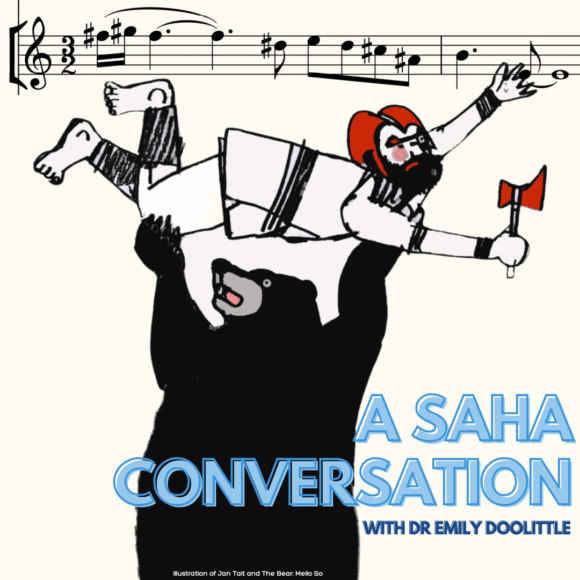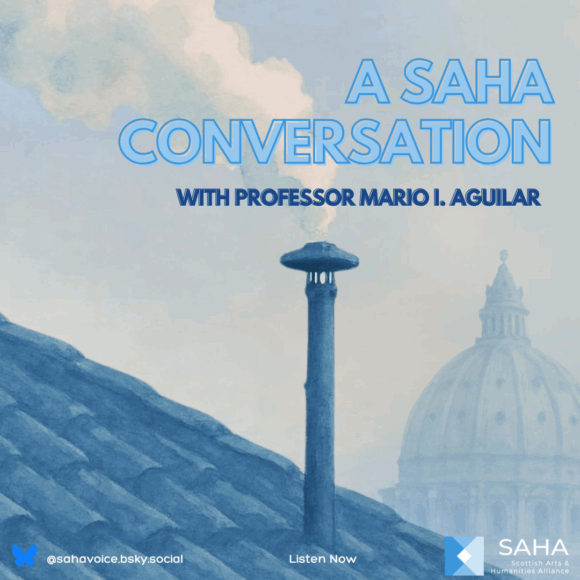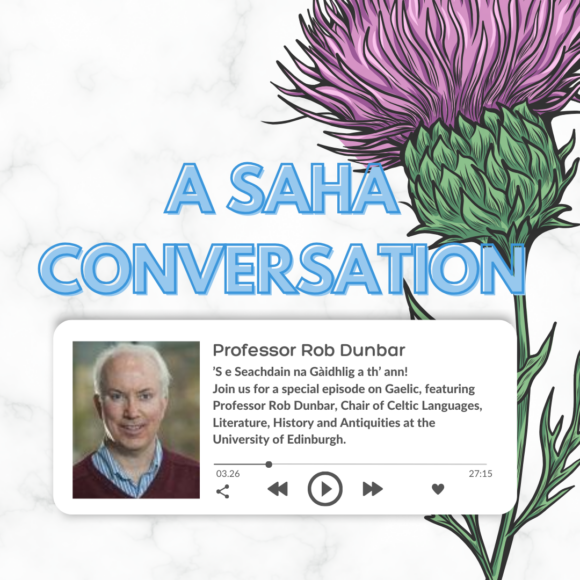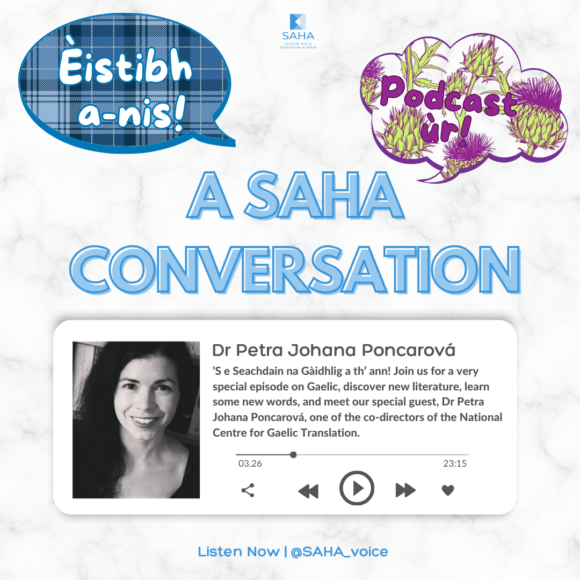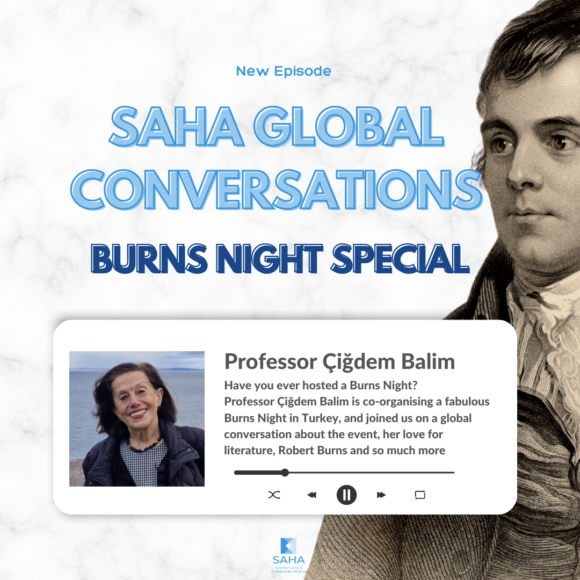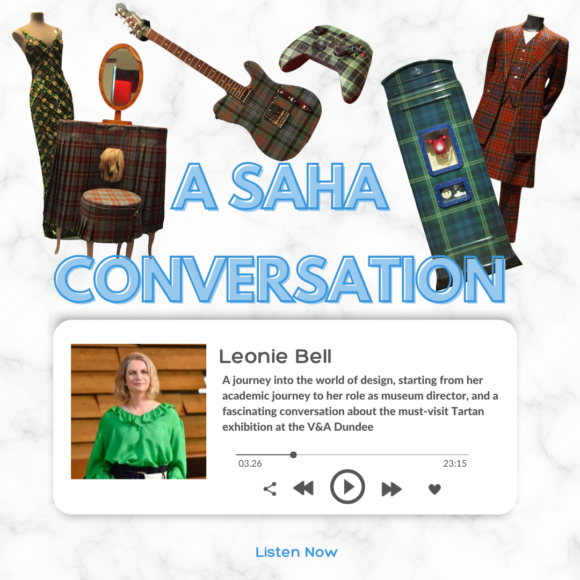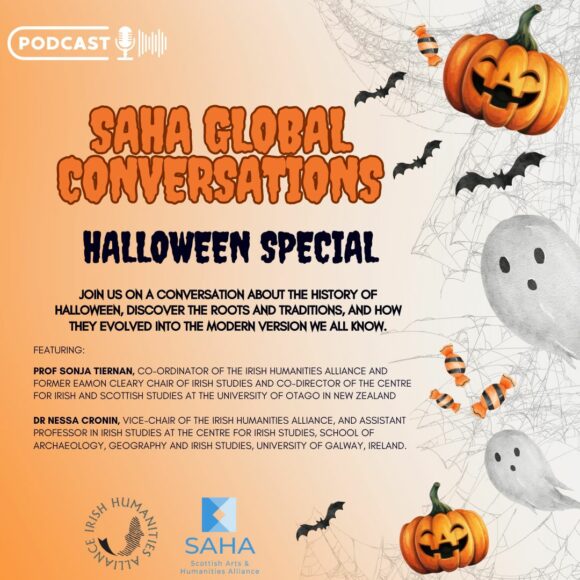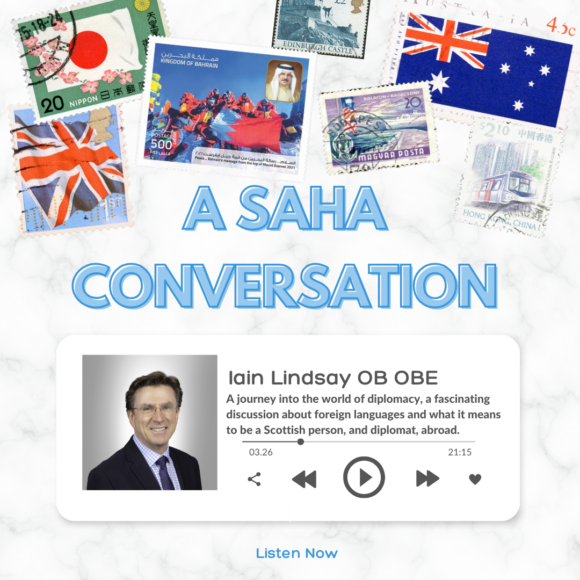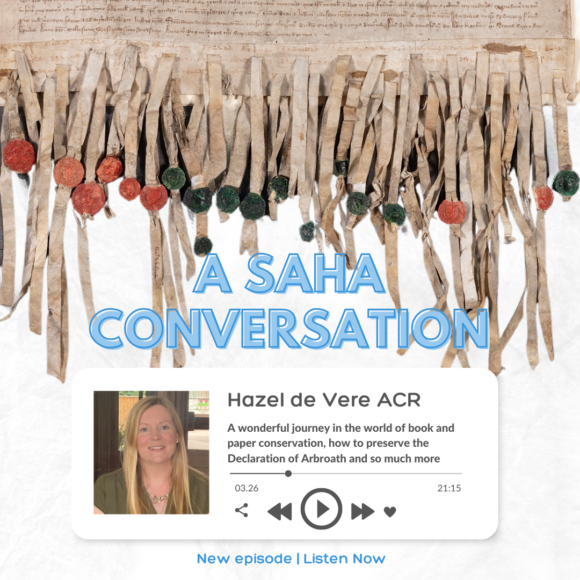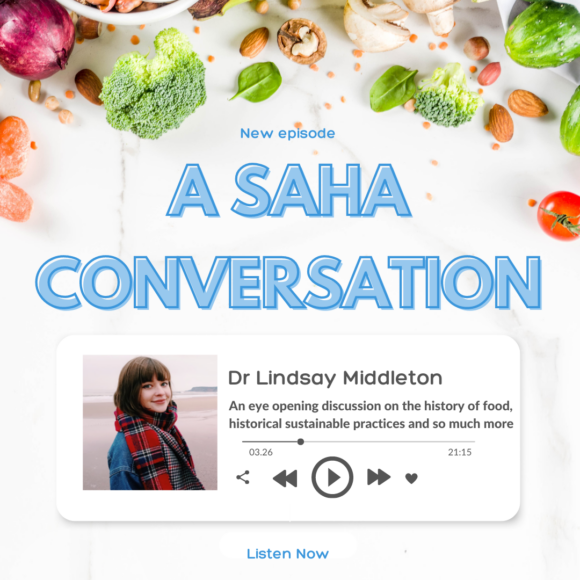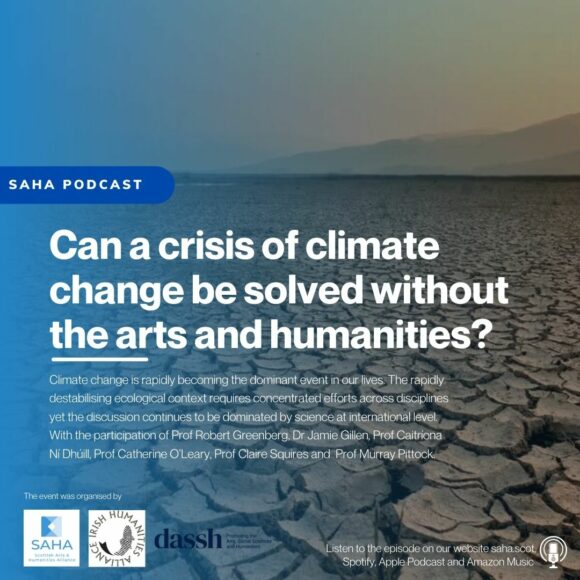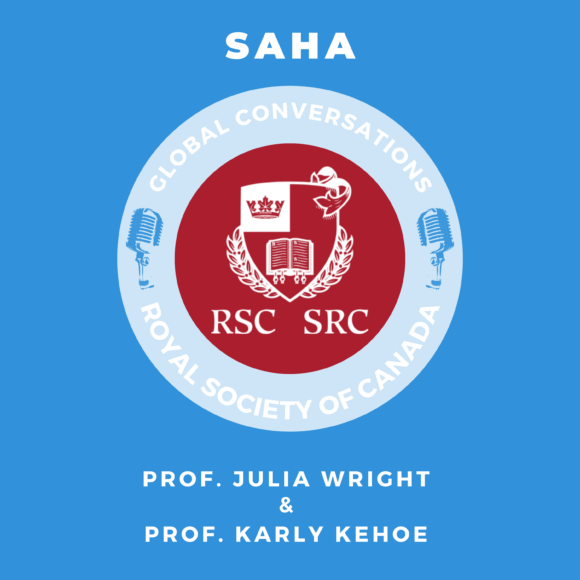The Scottish Arts and Humanities Alliance (SAHA) brings you a new podcast series, SAHA’s Global Conversations. In this new series we invite organisations from across the world to discuss arts and humanities. Together we reflect on the opportunities and challenges that we face in our individual settings but also collectively as a global community of arts and humanities academics, practitioners, thinkers and supporters.
For our first SAHA Global Conversation we welcome the immediate past President of the Australasian Council of Deans of Arts, Social Sciences and Humanities (DASSH), Professor Catharine Coleborne. Professor Coleborne is a Fellow of the Academy of Social Sciences in Australia and is a historian of mental health and institutions. From 2015 to 2022, she led and managed a large and highly diverse group of academics in humanities and social science and spearheaded the implementation of the new School of Humanities, Creative Industries and Social Sciences at the University of Newcastle. Her higher education leadership experiences include curriculum renewal and design; management of higher degree research students and administration; as Chair of the university-wide Educator Network (University of Newcastle), and sector-wide representation (Marsden Fund, Royal Society of New Zealand) and Excellence in Research Australia (Australian Research Council). As President of DASSH she has forged an increasingly positive public engagement for arts, humanities and social sciences since 2020.
Show notes:
Network of Associate and Deputy Deans
Students flock to humanities degrees despite huge fee increases
 Transcript
Transcript
[01:50] Cristina: Good morning, Catharine. And thank you for joining our conversation today. So, to start our conversation, can you tell us a little bit about yourself and the organisation you represent, please?
[02:01] Catharine: Thank you. Good morning. Yes. So my name is Catharine Coleborne. I’m a professor of history and I’m the Head of School of Humanities, Creative industries and Social Sciences at the University of Newcastle and I’ve been President of the Australasian Council of Deans of Arts, Humanities and Social Sciences since 2020. So it’s a two year term. I’m a historian and our organisation represents the full array of disciplines in the arts, humanities, and social sciences, so it’s a very broad organisation. We’ve just turned 20, so we’ve had our 20th anniversary, which is quite a landmark. We represent the leadership within universities, those people who play roles as Deans, but also Deputy Deans, Assistant or Associate Deans, and equivalent positions, sometimes people are a Pro Vice Chancellor, for example, or the organisation’s unit might be a faculty or a college. So it’s generally the academic leadership of the faculties in the universities. It’s volunteers, of course, on the board, and those who get involved with DASSH. We have 43 universities in Australia and New Zealand. And we have a network of Assistant or Associate Deans that we’ve developed called NOADD. And really, our organisation is an advocacy organisation. We also offer professional development, networking, and experience through events, conferences, and so on. And increasingly, as this podcast suggests, we’re also looking to global partnerships.
[03:41] Cristina: Thank you, and many more years ahead for your work. Just to talk a little bit more about DASSH’s work, I was wondering, are there particular projects or programs that you’re particularly proud of that the organization has run lately?
[03:59] Catharine: Yes. Well, as we’ve just celebrated our 20th birthday, I do feel compelled to talk about the fact that we’ve had a long history of advocacy as I mentioned, in terms of trying to influence politicians around education policy in the national context, and talking in the media and in public about the value of arts and humanities. And I know we’ll get on to those topics. Most recently, though, I feel very proud of our strategic plan. It was very important when I became president of DASSH really, because I think the board membership roles change every couple of years, essentially, it was important to build that new leadership team, we had some renewal there. And it was important to refocus. We’ve also been through a very difficult time globally in our disciplines, but also as a sector in, you know, in terms of COVID impacts on higher education and on universities around the world. But my leadership really started just before that. So I was very keen to build a strategic plan. And the focus of that plan has been on engagement, engagement broadly interpreted, but over the past year in particular, we’ve significantly increased our public profile. We’ve lobbied our government in Australia on major policy issues. We’ve appeared in the media both in print, online, and also in public, on the radio. We’ve given evidence to a Senate hearing about interference in research grant funding. And we’ve also formed some new partnerships. So I’m really proud of the engagement side of our organisation, what we’ve been able to achieve in a very short space of time, I think, but building on that long history of advocacy, so we didn’t start that from scratch. We’ve also developed new awards in the last two years. So we’re in our second year of awards for people in the sector, who nominate their academic colleagues who’ve performed leadership in the arts, humanities and social sciences. And we’ve had various events, including virtual events during COVID lockdowns 2020 and 2021. All of which were very, very good for boosting the morale of academics who were going through a very tough time. So I’m really proud of the engagement and you know, even though we’re building on the legacy and the achievements of people in the past, we have had to restart a couple of times. So I’m proud of our resilience and our, I guess, our fortitude.
[06:19] Cristina: That’s very interesting to hear. And I think we’re going to touch on a few of the items that you’ve mentioned already, but I think for my next question, and this is quite a broad question, so we might be here to discuss this all day, but there’s a lot of discussion nowadays across the globe on the value of arts and humanities. So just before we move to the next stage of the discussion, I wanted to ask you, where do you think this value comes from? Why do arts and humanities matter today?
[06:53] Catharine: Well, it’s the burning question, isn’t it? And I do feel that in the last few years, but I think this has been going on for a long time, actually. Perhaps, particularly in the last few years, we have felt as a group of global academics who all share this experience, we have felt somewhat on the defensive, and we have felt somewhat beleaguered partly because universities have been changing. So as universities have changed and moved in the direction of really asking the question, why do degrees matter? And why would students come in and enroll in a degree, they really want a career, they want vocational education, they want employability outcomes, and they want experiences during their degree that tie them to businesses or to employers, all of which I understand, and I think we broadly understand. But that has been interpreted inside universities and by policymakers as meaning that our particular subject areas don’t offer that value. And we know that to be false and we also know that there’s another line of argument, which is that universities for a long period of time, particularly in the older countries in the world, have been sites, or places for intellectual life and culture, and that learning for learning’s sake and lifelong learning are also important themes. And, you know, thirdly, that arts, humanities and social science disciplines are … really sit at the heart of what it means to be human. And so educating people in the nature of the global crises we now face around climate change, around the economy, around young people and their future, the impacts of the global pandemic, all of these things can be questions that we might solve with our disciplinary knowledge. And I think we need to get a lot better at articulating why we add value and why we have value. But obviously, we’ve all been in a position where we’ve been responding to change, and perhaps for longer than we know, really, I mean, these kinds of assaults, as we might like to call them on our disciplines and their strengths have been going on for a long time. But I think there’s something to be learned here about the fact that we also share some of this in common with our academic colleagues in science and in other fields; and I think that’s the critical question now is how do we get on the front foot to collaborate, to be interdisciplinary. Not to give up our expertise and our deep knowledge and inquiry, but to really foster a kind of new conversation about how we can look together at what challenges we face?
[09:34] Cristina: Thank you. And yes, you’ve mentioned some very, very interesting and important points there. And I think we’re gonna discuss this a little bit more as we move on to the later stages. But I wanted to ask you now just thinking of what you’ve said before, if you can think of particular examples of projects or programs that you’ve come across, especially maybe those that might have an international element to them, that were to illustrate the points that you’ve just made. What would those be?
[10:07] Catharine: It’s interesting to think of what the UK and Europe have been experiencing recently with heat waves and a lot more visible evidence, visceral evidence of climate change, which of course, Australia, New Zealand, and the South, the Southern part of the world have been, we’ve experienced that for a long period of time, including terrible bushfires, and so on. I think that probably crystallises our thinking a bit more now about the reality of global change. And as well as that the war in Ukraine and the fact that we are now looking at things that young people, even people of our own generation, I look at you and I maybe, we didn’t live through a previous war. I was born at a time when the Vietnam War was going on, but you know, essentially … apart from obviously, there’d been wars in Europe and in parts of the world, but this is … this has got the potential to sort of really change the way we think about conflict. So I look at those two things. And then I also think about the situation in Australia and New Zealand and other parts of the world with indigenous populations. And I think that there’s so much value that arts, humanities and social science scholars can bring to thinking about all of these questions, all of these challenges. And so it might be time for universities to think not just about employability outcomes for students, which in themselves are valuable and important, but also what are the big, bigger kinds of questions we should be really starting to tackle. And interestingly, in Australia this week, yesterday, in fact, President Zelenskiy, in the Ukraine, gave an online lecture to students in 21 universities around Australia. He was beaming into the Australian National University and the Australian National University made that available to other universities who were able to participate. And so there were 20 other universities who joined in. And if you look at Twitter around this time, so we’re in early August, as we speak, you’ll see a lot of visuals of all the students sitting and listening to that dialogue in lots of different lecture theatres, which is really powerful and really interesting. So essentially, the kinds of projects we could be looking at, I think, need to involve global … questions of global change. And they might involve thinking about how our indigenous members of society have had solutions in the past, particularly to climate change. And in Australia, you can point to environmental tactics and solutions that Aboriginal people have been using for a long period of time, for example. So the other question, I think we’d be looking at how governments, and I know that this has happened in the UK, have invested in digital infrastructure. So we’re at the precipice of… probably past the precipice really, at the tipping point of knowing that digital economies are really important. How do our disciplines play a role in preserving our culture, in selecting what should be digitised, in making digital tools and ideas about knowledge available, and so on? How do we shape that as academics and scholars. So in Australia, we’ve seen digital infrastructure investment in humanities and social science research. There are lots of good examples of teams across Australia. There’s an indigenous element to that, so the preservation of knowledge that would otherwise disappear, linguistics, endangered languages, in the Pacific region, and so on, all of those things have a bearing on global communities. And finally, I would say some of the most exciting things, which are beautiful to look at, are boundary crossing projects that involve design and art and science. And there’s a wonderful scholar example of this in Australia, a man called Grayson Cook, who’s an academic at Southern Cross University, in the northern part of Australia, and he has done some really wonderful work using digital scientific information that he then turns into artworks, but it has a deeper resonance and meaning when he talks about the meaning of the work. That’s just one example of many similar examples going on at the moment where we see that digital interface between art, science and culture. There are many more examples, but I would say that now it’s time for us all to embrace the fact that we need to move our thinking into a new future. And probably one of the biggest challenges for us is… as scholars in our disciplines, is to let go of things because we’re so deeply imbued with our humanities knowledge that the things that we’ve come to hold dear, I’m not saying we throw away all the books at all. But I do think we need to start thinking about new tools and new ways of engaging our publics. And I know we’re doing that.
[14:34] Cristina: And to continue on that note, my next question was actually related to challenges. So if we could expand on this a little bit, I think you’ve talked about this quite a bit but if there’s anything else that you think should be mentioned on this topic?
[14:49] Catharine: I don’t know enough about what has propelled the changes in the UK, but certainly government policy shifts that have meant universities can no longer fund the full array of disciplines in all the universities and there’s been a narrowing of offerings. I’ve noticed that in English institutions in particular, there have been job losses as they have been in Australia. And this is partly to do with the downturn of university funds due to COVID and the different movement of students in our case, international student enrollments, and revenue. However, there’s also something else going on, which is about the privileging of certain types of learning in certain institutions. And I think what we’re seeing as a global challenge for our disciplines, you know, that’s one way of answering your question, is that we’re seeing a different form of elitism creeping in where some students will be able to study the arts and humanities in the best institutions; in the context of the UK, let’s say, the Russell Group and Oxbridge. And in the context of Australia, we call it the Group of Eight. And there’ll be other examples in the world. I think that’s a problem. We have many students in the context of Australia and New Zealand who study in regional universities or small universities that are not in cities and not in metropolitan capitals of culture. So we need to be thoughtful about how we’re differentiating between these institutions. That’s a global challenge. And that’s been propelled a little bit by policy, but also by this push for vocational education from within universities, I think. So there’s the funding challenge. I have talked about global challenges on a world scale that are political and environmental. I think those are very real. Perhaps human migration, we haven’t talked about, you know, some of the challenges for people around the world who are displaced people, refugees. And one of the things we’ve noticed in Australia is refugees seeking higher education access and entry, which I think is really, really critical. And we could add to that all the questions of equity, diversity and inclusion, and making sure that education isn’t the province of of the very rich or those with connections in a social sort of setting. So really, we need to preserve the meaning of the university as a place for education. And all of these things are very complicated, you know, you can’t necessarily untangle them. The policy shifts we’ve seen in the last decade, under conservative governments often have led to, I think, a kind of amelioration of some of the concerns for universities around, you know, access, if there’s been some attempts to kind of provide access through scholarships. But in other ways, there’s been a kind of demolition of access to education. So think it’s been a very sort of strange time for universities all around, and particularly for our disciplines.
[17:37] Cristina: And COVID hasn’t helped matters too much.
[17:38] Catharine: No, not at all.
[17:41] Cristina: And in terms of what you’ve been saying about the challenges, and thinking about the particular case of Australia and New Zealand, where DASSH operates, are there any particularities that you can highlight?
[17:55] Catharine: Yeah, so the two that spring to mind most readily are, the previous Conservative government introduced a new funding regime for universities, that was known as a reform, called the Job Ready Graduates Package. And it changed the way students would be funded for places in universities under the Commonwealth Contribution Scheme. And this raised the fees for students in the humanities astronomically, so by 113%. And it also meant that the amount of funding coming to universities for those students from the government was reduced. But at the same time, the government also reduced the amount of funding coming to universities for students in other fields, such as education, engineering, and the sciences and basically, the whole package was flawed. It was described as a way to kind of promote STEM education, particularly for employable students going into STEM fields following graduation. But it’s had the opposite effect because it’s actually meant that students have picked up on the fact that while some degrees are more expensive, and some are cheaper, they’ve still voted with their kind of interest and their passion, at least for now. And it’s also created a bit of chaos in university accounting, which universities are doing their best. On the positive side, I think ultimately, you could say it would be great to have more interdisciplinary education. But it isn’t playing out like that, because it’s actually just reinforcing some of the problems inside university finances. And it’s not solving or challenging student choice very much. So that’s a very potted version of a very big and complex issue. The second one, and of course, now we have a new government in Australia and it’s not a Conservative government. And it’s a government that wants to do some interesting work around education. So we don’t know whether Job Ready Graduates Package, as it was called, would be tweaked (maybe) or changed a bit or, and I don’t think it’ll be happening overnight, because that would be problematic as well for everybody. However, some attention to this and a renewed focus from the government, the newly elected government is going to be great and positive. I think the second thing I was about to talk about is commercialisation of research. There’s new policy around that. And I mean, that worries the scientists just as much as it worries the humanists, because not everything in research can be commercialisable, or turned into some kind of product. And I recently spoke on a panel as part of, you know, what’s the defense for pure or curiosity driven research. And we had a scientist on that panel, as well as me. And I think we agree entirely that we need pure, basic curiosity driven research coming from universities. And the question now is, how do we fund that? So there seems to be this sort of push towards everything being really, you know, kind of user pays, it’s the sort of last vestiges of the conservatism that was ruling in Australia for a long time. But the trick is, how is a new government going to tackle that. And in New Zealand, that has been going on for a longer period of time. I mean, I think the same issues have played out there. I used to work in New Zealand, there’s more attention, I think, to equity now under a Labor government there in terms of higher education. But there are very small amounts of money for research funding in our countries, compared with the UK and the US, and Canada, for that matter. We have, you know, really only one or two options for what we call blue sky research funding, and everything else is being pushed towards industry partner funding, and now this new push towards commercialisation. So I think many of us are feeling a little tired of this constant sense that we’re not doing it right. When actually many of us have fantastic projects with social impact that are meaningful to our communities and that could be very, very game changing.
[21:40] Cristina: Thank you. I think I remember reading an article that had some comments from you saying that, although the structure degrees has been a restrictive somewhat, it hasn’t deterred the students from actually pursuing degrees. So with that, I wanted to move to a more positive side and ask you about the opportunities. But I think it would be good to reflect a little bit on what you’re saying in that piece also, and we will link the article to the podcast so that the listeners can read it also.
[22:16] Catharine: Okay, that’s lovely. Thank you. Yes, I mean, students have said, they really won’t be deterred by this. And of course, we have to remember that what students are doing is mounting a student debt to do that. So what I resent for them, on their behalf, is that they’re taking on larger debts to do the same degrees that students only a few years ago didn’t have to do that. So that’s of concern to us. But it’s good to see that students will still undertake what they want to do at university. I mean, as long as that holds true, I suspect we’re probably still in the early days of this. Of course, a student who’s interested in the arts and humanities isn’t suddenly going to turn and choose engineering. I mean, that’s not going to happen. It would be wonderful to capitalise, as I’ve said already in this interview, on a more interdisciplinary sort of connections between arts and digital learning, and maybe engineering. Those things really excite me, I think there could be wonderful frontiers for students, so that we can get out of our silos and so on. So the opportunities might include… curiously and perversely, the pandemic offers us an opportunity to think as a group of people who are all joined together by adversity and to think about the big questions facing humanity. Similarly, climate change, and similarly, the threat of military action by a world superpower, that if we were able to show how our thinking about humanity can really lift us out of these challenges, or at least help us work through them. I mean, everything from Psychology and Social Science responses to, you know, how humans might adapt and be resilient, or, you know, help each other through mental health challenges. A discipline like social work, for example, is really profound there, I think, right through to thinking about the historical impact of climate change. And there, there’s a very strong environmental history group now across Australasia, and I’m sure that’s echoed in other parts of the world. And they’re doing wonderful work mapping climate change, indigenous responses, and so on. So all of those are positive contributions. And I think we do have this opportunity now to inspire our young people, and to involve our young people in thinking about how their contributions by thinking about these ways of knowing, these epistemologies, might actually have an impact on the world. So essentially, showing their value.
[24:39] Cristina: Thank you. In our last podcast series we had a wide range of speakers from different disciplines and they were talking about the impact of Arts and Humanities thinking in their particular sectors. And we’re talking about maybe sectors that you wouldn’t think of like energy, or banking, or international relations. So I was wondering if you can think of particular sectors where arts and humanities work is particularly prominent at the minute?
[25:13] Catharine: Well, an example close to me in the school that I’ve been leading, there is this very strong youth Studies Group of youth sociology experts, and exponents, probably the strongest in Australia, if I’m honest, and they align very well with University of Melbourne too. They’ve been doing some very interesting work on young people and employment by interviewing young workers, people who worked in hospitality during the pandemic, for example, or who were not working during the pandemic more precisely, so precarious workers. They’ve also been looking at financial apps and young people’s exposure to debt, and also to housing affordability. And, in fact, one of our researchers was named as one of the five top young residents for the ABC, which is the Australian Broadcasting Corporation radio, because they have a program to have five humanities scholars who might be given training to be public communicators. And that’s a real honour. So somebody coming out of that group who can influence people’s thinking about young people in debt, I think that’s quite impressive. And you prompted me by talking about banking. We’ve also had people working on mining research and the impact on many mining communities around Australia, including where I live, you know, people want work, they want to be in work and they don’t necessarily want environmental solutions because it takes away their employment. So there’s been some great work on remediation by architects, by anthropologists in mining communities, which I think is really powerful and helpful for, you know, social change. These are just two examples. I also love the examples of Digital Humanities because they involve historians and literary scholars who can actually bring to life, some really old, you know, examples of even, you know, Shakespeare. One of our scholars has done some work on reinterpreting Shakespeare’s writings using digital technology. And I’ve cited ones close to me. But these are really good examples. There’s many others across the country, people looking at, you know, histories of war and conflict, for example, who are able to plot the course of human agency for wider audiences over time. So yeah, many examples. And I think our sectors therefore are arts and culture, education, public sector, the mining industry, you name it, there’s all sorts of places where we have an impact.
[27:34] Cristina: I absolutely agree. And I think we’re gonna see more and more of that as we move on. We’ve mentioned the international community quite a bit during our discussion today. So I wanted to ask you, what do you think the international community can do together, or maybe can do more of, that they’re already doing, to advocate for arts and humanities. And maybe what should be the names for those activities?
[28:04] Catharine: I think we are seeing a renaissance of collaboration and sharing of ideas and knowledge because of being in lockdown or being, you know, using virtual methods of communication. I think that’s kind of been a positive aspect of what’s happened. We’re seeing a lot more virtual conferences and online forums such as this one. So collaboration and knowledge sharing, resource sharing. I think the sharing of resources is really critical. Because I have a sense in universities in particular, and in these kinds of organisations, that we’re all doing similar things. And perhaps we could be sharing resources so that we’re not all reinventing things from scratch. And that takes a lot of trust. It takes a lot of bonding across organizations, and also some adaptation across sectors, or locations, or countries. There might be different things that are relevant here and there that don’t make sense in one place, but do in another. So I think all of those things are really important. When it comes to collective action, I suppose research funding springs to mind and, you know, being able to share and grow sources of research funding for collaboration would be good. I think we’re faced with challenges of sustainability, because coming to conferences in Europe and the UK from Australasia is expensive, and we worry about the environmental impact. So how can we do this so that we’re sharing, maybe there’s a two way engagement, bringing more scholars our direction. I mean, that won’t help the global footprint of the airplane traffic, but I think we’ve got some imbalance, really, in the world of intellectual ideas. I think we tend to go out more, which is not a complaint, but that’s how it’s been historically. So I wonder whether we develop really good virtual platforms, using sources of funding. I’m thinking out loud here, that maybe could, you know, make these collaborations easier and better, and even potentially more engaging, I think advocacy, you know, it’s really important. I’ve been in conversations with the British Academy, through DASSH and the learned academies in Australia, the Academy of Humanities, and, in particular, the Humanities, but also Social Sciences Academy in Australia. And there’s been a conversation around the use of the acronym SHAPE, which has been an ongoing one about how to do that, whether it’s useful and how to get buy-in. I think it’s a bit of a slow kind of burn that one. So I think as long as we’re talking together and sharing knowledge, I think it’s very powerful. Perhaps maybe we could say, some solidarity around academic positions. It’s a complex one, though, because often we’re representing employers when we’re in our Dean roles so it’s very, very difficult to know how to do that effectively. But I think the way to do it is actually what we’ve been talking about, which is to champion the value of our disciplines, of our degrees and of the outcomes for students.
[30:52] Cristina: Thank you. Yes, we’ve engaged with SHAPE also, and tried to think of how we can use SHAPE through our work at SAHA also. So it’s very interesting to hear and you’re just, you know, thinking of these ideas now, but I think they’re very interesting and relevant to consider going forward. And as we shape these kinds of global conversations that we are having through the podcast series also. So just going back to DASSH and its immediate or more distant plans, I wanted to ask you what’s in the cards for the organization now going forward?
[31:31] Catharine: I feel really confident that we’ve become a quite powerful organisation, that’s visible, where our membership is strong, and we’re continually showing our members what we’ve been able to contribute on their behalf and how we have advocated. We will have some new leadership coming in September and that will be exciting for the organisation. It’s really important to renew. Our next strategic theme, because we’ve had this idea of having a theme each year. I mentioned ‘engagement’ has been our current platform theme. But we’re looking at the idea of of talking to our members about ‘inclusion’ as our next big theme. And that is partly to really address a question that DASSH needs to address much more in our Australasian context, around indigenous – so Maori, Pacific, Aboriginal Torres Strait Islander peoples – and how we can involve their perspectives and their leadership more. But also, inclusion in its broadest framing of diversity and inclusion. And all the debates that are going on now around gender diversity, as well as disability and ableism, and all the big questions. So I think inclusion will be a great one for us to take forward and maybe encourage a bit of critical thinking and self criticism. I think that’s really important. It’s not often that you see Deans who might come from minority groups, there’s a sense that it’s time now to challenge our leadership in universities. So I think that’s going to be a really fantastic one to take forward. And also might draw on the strengths of our disciplinary knowledges.
[33:00] Cristina: Thank you. That’s, I think, a wonderful way to conclude our conversation today. So thank you very much for joining us. And we look forward to seeing more of your work.
[33:10] Catharine: Thank you so much, Cristina. I’ve really appreciated talking, and I feel that… I think it’s been a terrific conversation. So good luck to you as well. Thank you.
